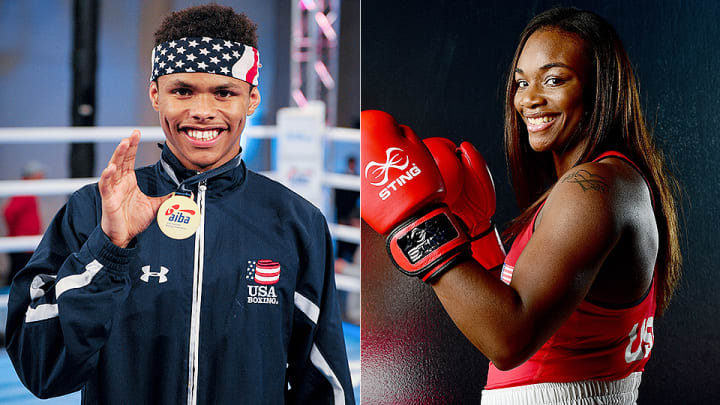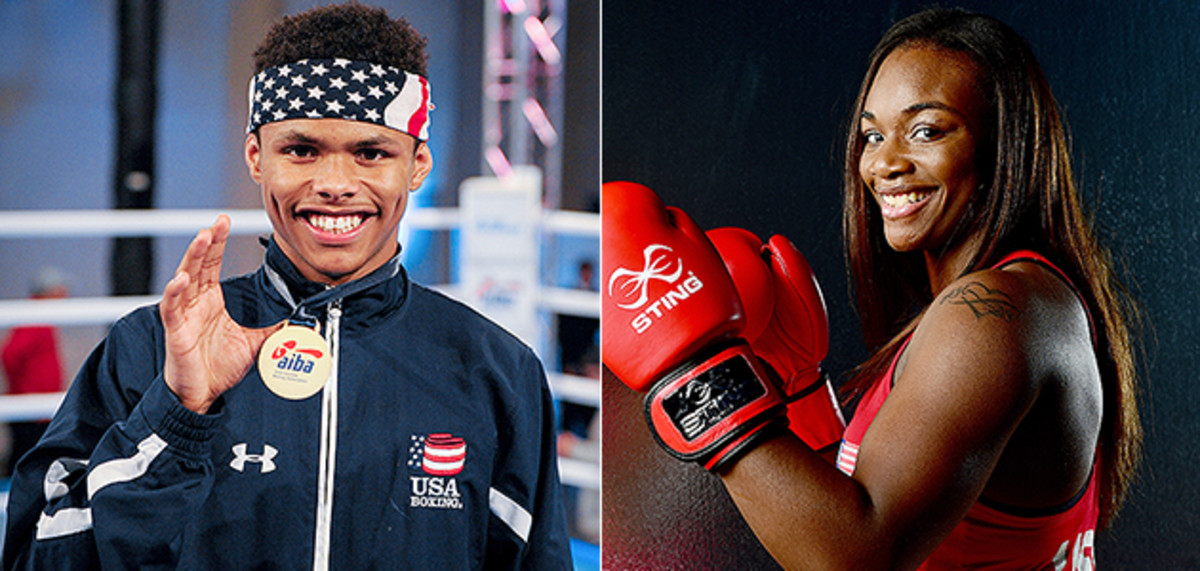Boxing preview: Shields, Stevenson lead U.S. boxing into Rio Olympics

Your teams on the go or at home. Personalize SI with our new App. Install on iOS or Android.
The United States is undeniably the undisputed heavyweight champion of Olympic boxing, with more gold medals (49) and more total medals (110) than any other country, and a long roster of the sport’s most iconic stars, including Muhammad Ali (then Cassius Clay), Joe Frazier, George Foreman, Sugar Ray Leonard, Mark Breland and Oscar De La Hoya among many others. But this champ’s glory days have long since faded into memory. No American man has won an Olympic boxing gold since Andre Ward in 2004, and at the most recent games the U.S. men failed to win a single medal of any color—the equivalent, basically, of an old champion being KO’d in the first round.
Don’t expect a glorious comeback in Rio. On the men’s side, the U.S. qualified boxers in only six of the 10 weight divisions, with none in the three heaviest classes. (Given that Olympic boxing was opened to professionals for the first time this year, couldn’t somebody have drafted Foreman?) Things are a bit brighter for the U.S. on the women’s side, where two Americans will be competing (out of three weight classes), including 165-pounder Claressa Shields (see below), who four years ago in London became the first American woman to win a boxing gold medal. Still, two significant rules changes for boxing in Rio—doing away with headgear for the men and switching to scoring on a subjective points system rather than the previous much-maligned punch-counting method—should liven up the action throughout the tournament. And the new scoring system may well play more to the American style of boxing.
Among the American men, the best hope for a new golden era most likely lies with 123-pounder Shakur Stevenson. The 19-year-old from Newark, N.J., is undefeated (23–0) in international competition, including gold-medal wins at the 2013 junior world championships and 2014 youth world championships and 2014 Youth Olympic Games.
• RIO OLYMPICS PREVIEWS: Men’s basketball | Women’s basketball | Rugby | Diving | Tennis | Triathlon | Men’s soccer | Women's soccer | Field hockey | Sailing | Wrestling | Table tennis
The oldest of nine siblings and named for rapper Tupac Shakur, Stevenson was introduced to the sport at the age of five by his grandfather, Willie (Wali) Moses, who ran a boxing gym in Newark. His hours in the gym gave the young Shakur a sense of purpose and helped keep him off the rough and often dangerous streets of Newark. He quickly blossomed in the ring and by the time he was 13, Stevenson was, as he put it, “in love and I’m married to boxing now.”
It’s clearly a happy union. A quick and technically sound southpaw with a brilliant jab and a seemingly perpetual smile, Stevenson intends to turn pro after the Olympics with the dream of hitting it big and providing a better life for his family while also bringing hope and change to his troubled hometown. He knows that victory in Rio would be the ideal launching pad for that dream.
“I want to bring a gold medal back to the city,” he told the Wall Street Journal. “I want people to focus more on positives.”
A Stevenson gold would certainly be a long-awaited positive for U.S. amateur boxing as well.

Athletes to Watch
• Michael Conlan, Ireland,123 pounds
The Belfast-born Conlan, 24, is likely to be the man in the way of Stevenson’s quest for gold. The reigning world champion and currently ranked No. 1 in the world at 123 pounds, Conlan has Olympic experience already, having taken a bronze in the 114-pound class at the London Games.
Though he started boxing as a kid (coached by his father, John), as a young teen, Conlan says, he led “kind of a double life,” running with a hard crowd on the streets of Belfast West. “I was involved in drugs and drinking from a young age, and stealing and vandalism” he recently revealed in the Belfast Telegraph. “I was young and stupid, but when I look back now I wouldn’t change it because I realize it’s made me who I am today.”
Conlan says he began to turn things around when he qualified for the Commonwealth Youth Games and realized that with focus he could succeed in boxing at the highest levels. The sport, he says, saved him from the kind of ruin he sees too many other young people falling victim to. Now engaged and the father of a 16-month-old daughter, he is also an ambassador for Aware NI, a mental health charity that works with those suffering from depression and bipolar disorder.
• See SI’s Olympics coverage | Listen to the Very Olympic Today podcast
After the Olympics, Conlan knows that a lucrative professional career awaits, along with the chance to continue his outreach with even greater effect. For now, though, he is focused solely on his bouts in Rio.
“My preparation has been great,” he says, “and I feel that I’m just at the right place at the right time.”
For a taste of what awaits Conlan’s opponents in Rio, check out his 360-degree sparring video:
• Claressa Shields, U.S.,165 pounds
Just 17 in 2012, when she became the first American woman to win an Olympic boxing gold medal, and the only U.S. boxing gold medalist—male or female—since 2004, Shields, now 21, and with a career record of 74–1, will head to Rio as the favorite in the 165-pound division. She will also head to these Games much more experienced and comfortable being in the public eye than she was before London.
Shields grew up in Flint, Mich., and endured a childhood marked by poverty and sexual abuse. For her, boxing became a way to overcome the pain and the anger brought on by her surroundings. It was also something at which she could excel. When she returned to Flint with her gold medal, she hoped that her win would bring some attention to the troubled city and bring her some financial opportunities in the way of the endorsement contracts she had seen other Olympians getting, opportunities that would help take care of her family. But no offers came. Shields believes it was because potential sponsors were scared off by the image of a woman in a “violent” sport.
So Shields made the decision to postpone a pro career to try for a second gold and—while she still doesn’t apologize for “liking to hit people”—she has worked hard to polish her public style. Media attention and commercial success have followed. A documentary on her life, “T-Rex: Her Fight for Gold,” premieres Aug. 2 on PBS, Universal is planning a feature film based on her story and she has sponsorship deals with Dick’s Sporting Goods and Powerade.
Shields says she’s not sure now whether she’ll turn pro after the Olympics, but she is certain that she wants to continue being involved with trying to help the people of her hometown.

Sports Illustrated At The Games
Subscribe to SI's Olympic podcast coverage



• Julio Cesar La Cruz, Cuba,178 pounds
Traditionally one of the powers in international amateur boxing, Cuba earned only four medals at the London Games. Look for the country to improve on that total in Rio, as Cuban men have qualified for slots in all 10 weight classes. The best bet among them is probably the 26-year-old La Cruz. Though upset in the quarterfinals in 2012, he is a three-time world champion and two-time Pan Am Games gold medalist. In 2014, La Cruz was shot in the hip during a robbery in his hometown of Camagüey, but recovered quickly.
Known for his hands-down and dramatically elusive style, the 5' 10" La Cruz can also punch with authority. And, after his disappointment in London, he is headed to Rio determined to make an impact.
• Katie Taylor, Ireland,132 pounds
Her personal website, katietaylor.ie, is subtitled “Official Website of the World’s Best Female Boxer,” and she’s certainly entitled to make that claim. Hugely popular in her native Ireland, Taylor was the face of the first Olympic women’s boxing tournament, at the 2012 London Games, winning in great style. She is also a five-time world champion and, coming into 2016, had not lost a bout in five years. But, at 30, is she still the world’s best? In April, Yana Alexseevna of Azerbaijan snapped Taylor’s 82-match streak, and at the world championships she lost to Estelle Mossely of France. Taylor remains a powerful force in the ring, however, and says, “I think I’m as hungry now as I ever was.”
• Tony Yoka, France,201-plus pounds
The 24-year-old Yoka is something of an anomaly among the super-heavyweights. Unlike so many of the leviathans in the sport’s heaviest class, the 6' 6" Yoka carries little excess weight, generally coming in at a well-defined 230 pounds or so. Known at The Artist, he is fast of hand and foot and moves in the ring more like a light heavyweight. Last year, at the world championships in Doha, Qatar, he beat Ivan Dychko of Kazakhstan 3–0 to take the gold medal.
The battle for the gold in Rio will likely come down to the same pairing. But whatever happens in that bout, Yoka will still be looking ahead to one more match this year. He and French teammate Estelle Mossely are engaged and plan to wed after the Games.
Medal Rounds
Sun., Aug. 14
Men’s light flyweight
Mon., Aug. 15
Men’s heavyweight
Tues., Aug. 16
Men’s lightweight
Wed., Aug. 17
Men’s welterweight
Thurs., Aug. 18
Men’s light heavyweight
Fri., Aug. 19
Women’s lightweight
Sat., Aug. 20
Men’s bantamweight
Men’s middleweight
Women’s flyweight
Sun., Aug. 21
Men’s flyweight
Men’s light welterweight
Men’s super heavyweight
Women’s middleweight
